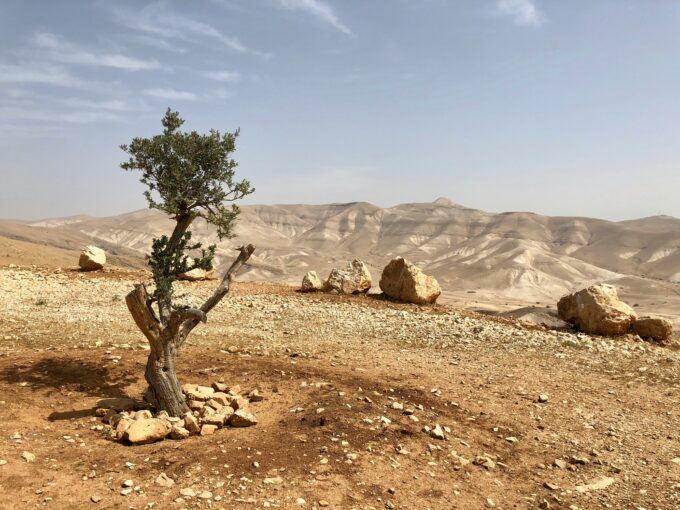History, Olive Trees and Football: What Keeps Palestinians Strong

Image by David McLenachan.
Despite the horrific war in Gaza and the unprecedented number of casualties, millions of Palestinians in the Middle East and around the world took a brief respite from their collective pain to watch their national football team make history in Doha.
The Palestinian team, also known as Fada’ii – the freedom fighter – scored a decisive win against Hong Kong on January 23. Even though the ‘Lions of Canaan’ finished in third place, following Iran and the UAE, they still managed to make it to the round of 16 of the AFC Asian Cup for the first time in history.
Like the FIFA World Cup, also held in Doha in November 2022, Palestine was present in all AFC games, where Palestinian flags were waved by thousands of Arab fans.
Palestinian players came to Doha from Palestine itself, and also from throughout the Middle East – in fact, the world. They include the Chilean Palestinian player, Camilo Saldaña, and the likes of Oday Dabbagh, a Jerusalemite who is currently playing professionally in Belgium.
Sports, for Palestinians, is a symbol of unity but also persistence. Very few sports teams in the world have been through what these youth have experienced, whether in the form of direct harm to them and their families, or through their association with the Palestinian collective.
Yet, the fact that they can, against all odds, attend games, participate in tournaments, equalize against such prestigious teams as the UAE, and even win, is a sign that the Palestinian nation will never be erased, not 75 years after the Nakba, or a thousand years from now.
A very long distance away, another Palestine-linked team, the Chilean Deportivo Palestino, continues to express its historic connection to Palestine, despite the distance, different geopolitical spaces, culture and language.
Before FIFA admitted Palestine as a member in 1996, Deportivo Palestino served, at a more symbolic level, as the Palestinian national team in exile. Its players donned football jerseys adorned with Palestinian cultural symbols and other historical references to Palestine – a map, the colors of the flag and so on.
Quite often, the players would enter the Primera Division stadiums wearing the iconic Palestinian black and white keffiyeh.
Palestino is over 100 years old, and the history of the Palestinian community in Chile is older than this. It was Palestinian Christians, not Muslims, who established the community there, which refutes the claim that the so-called Palestinian-Israeli conflict is one over religion.
While faith and spirituality are critical signifiers in the Palestinian national identity, Palestinians are driven by the kind of values which allow them to find their common ground, whether they are in Gaza, Jerusalem, Santiago or Doha.
While Palestinians, like the vast majority of people around the world, are football fanatics, for them sports is not just about sports.
Imagine a football field brimming with Palestinians from different religious, geographic, political, cultural and ideological backgrounds. They come, whether as fans or players, motivated by a single objective, celebrating their culture while emphasizing their national continuity, as an immovable reality despite the ongoing attempts aimed at its erasure.
Here, other symbols become relevant: The flag, as a banner that unifies all Palestinians despite political factionalism; the keffiyeh, the ancient peasant symbol, used to fight colonialism over the course of many decades; the map, presented without lines, walls, fences or zones, to remind them that they belong to a single historical narrative, and so on.
In fact, there is more to symbolism. Arab and Muslim masses, all rallying around Palestinians in their quest for freedom and justice, also send a strong and unmistakable message: Palestinians are not alone; they are, in fact, part and parcel of cultural, geographic, historical and spiritual continuity that spans many generations, national flags and even borders.
While millions of people are currently feeling the pain of Gaza, expressing unprecedented solidarity with the suffering civilian population, Arab masses feel that pain at a whole different level. It feels as if the Arab and Muslim peoples have internalized the pain of Gaza as if it were their own. In many ways, it is.
Yet, despite the indescribable pain and suffering of millions of innocent civilians, there is always that historic certainty that Palestine will, as it has always done, ultimately prevail over its torment and tormentor.
Here, no other symbolism can serve the role of the powerful metaphor as that of the olive tree. It is as old as history, as rooted as hope and, despite everything that this tree continues to endure in the land of Palestine, it will continue to produce some of the world’s best olive oil.
Palestinian farmers do not simply see their olive orchards as a source of income but as a source of strength and love. The late Palestinian poet, Mahmoud Darwish, wrote in his seminal poem, “The Second Olive Tree”: “If the Olive Trees knew the hands that planted them, Their Oil would become Tears”.
One day, Palestine will become a reality, free of pain, suffering and tears. But even then, Palestine will continue to be a generator of meaning that will keep future generations as conscious of their past as they are eager for the future.

0 Comments:
Post a Comment
Subscribe to Post Comments [Atom]
<< Home